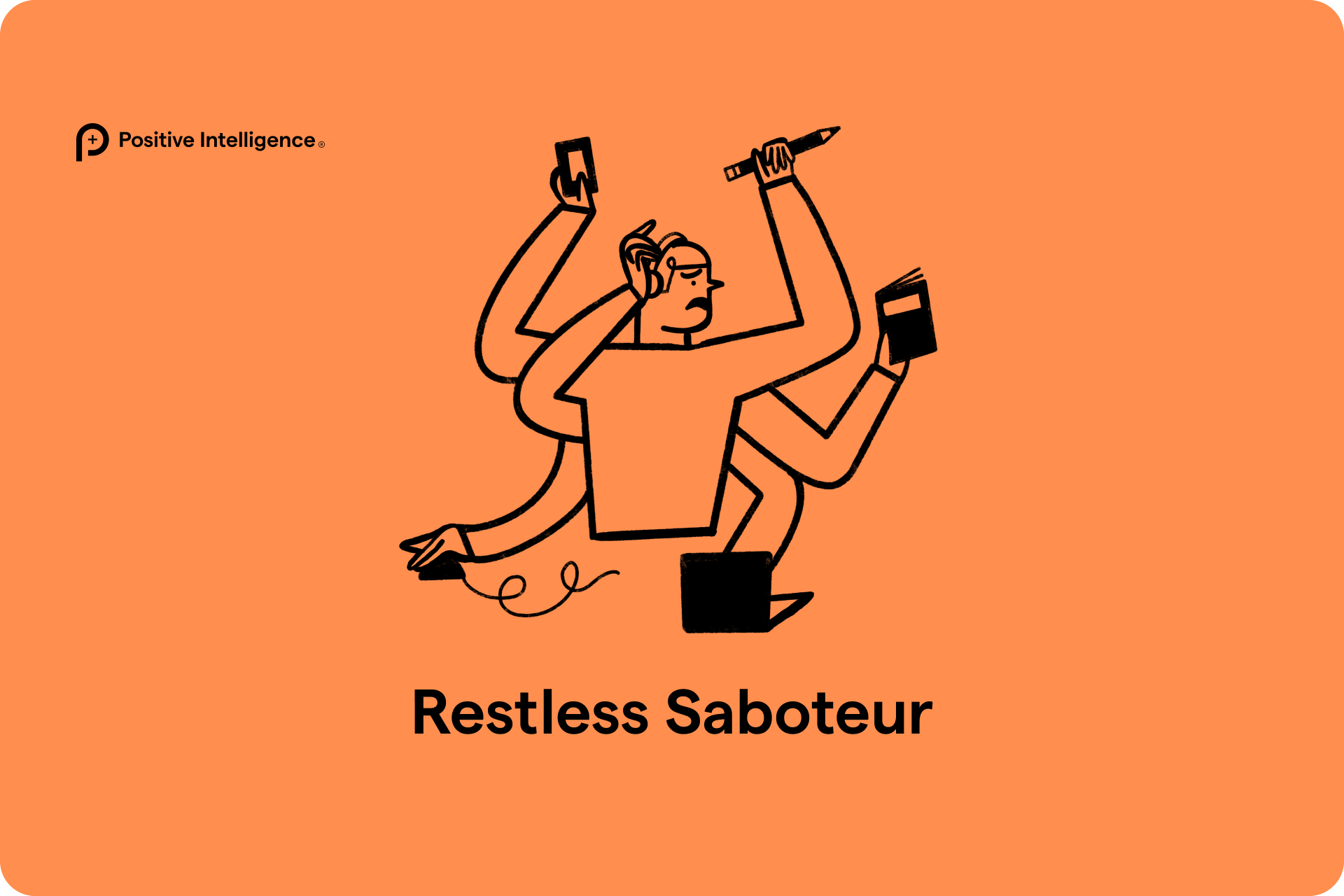
Individual
A self-facilitated program to boost your mental fitness for personal and professional growth
This website will offer limited functionality in this browser. We only support the recent versions of major browsers like Chrome, Firefox, Safari, and Edge.

Select the experience that fits your needs

A self-facilitated program to boost your mental fitness for personal and professional growth

A self-facilitated mental fitness program with exclusive pricing for 2 to 25 individuals

Explore coach-led mental fitness programs with workshops tailored to your organization
Growth Mindset

Saboteurs are subconscious patterns of thought and behavior that arise from fear and insecurity. They operate stealthily, sabotaging our mental peace, productivity, and wellbeing. The Restless Saboteur, in particular, manifests as a constant need for productivity and busyness and a struggle to find inner calm and focus amid continuous distractions. Here’s what you need to know about the Restless Saboteur and some effective strategies for minimizing its negative influence.
Saboteurs are deeply ingrained patterns of thinking and behavior that limit your potential and hinder your ability to perform at your best. They are internal critics that operate based on fear, self-doubt, and negative self-talk. Saboteur patterns can take various forms, such as the Avoider, the Hyper-Vigilant, the Victim, and more. Each Saboteur has a unique way of sabotaging your wellbeing and success.
The Restless Saboteur constantly searches for greater excitement in the next activity or constant busyness. This Saboteur is rarely at peace or content with the current activity.
Easily distracted, the Restless can get too scattered, staying busy and juggling many different tasks and plans. The Restless seeks excitement and variety, not comfort or safety, and quickly bounces (escapes) from unpleasant feelings, seeking constant new stimulation.
Here’s what to look out for as the Restless tries to impose its lies and limiting beliefs on you.
The Restless Saboteur’s need to find constant new sources of excitement, pleasure, and self-nurturing could be associated with specific early life experiences. Such experiences may include inadequate parental nurturing or painful circumstances. The Restless Saboteur’s indulgence not only provides substitute self-nurturing but also an escape from having to deal with anxiety and pain.
Underneath the surface of the fun and excitement of the Restless Saboteur is an anxiety-based escape from being present in the moment. Rather than deal with unpleasant things, the Restless avoids focusing on issues and relationships that truly matter.
Others can have difficulty keeping up with the frenzy and chaos the Restless Saboteur brings, making it challenging to build sustainable relationships.
1. The first thing to remember is that if you’re in negative emotion for more than a second, you’re in Saboteur mode. You must label your thoughts and emotions at that moment as Saboteur and let them go. To be able to do that, you need to have studied your Saboteurs (including the Restless) and discredited their lies and limiting beliefs. Take the Saboteur Assessment to get started.
2. The next step is to perform a PQ Rep, which is a 10-second hyper-focus on one of your senses. PQ Reps are powerful ways to command your mind to quiet the region where your Saboteurs live and activate the region where your Sage (positive self) lives. Whenever you catch the Restless or your other Saboteurs, do PQ Reps to pause and choose a more positive response. Visit the PQ Gym to try some guided PQ Reps.
In addition to catching the Restless and performing PQ Reps, try these practices to minimize this Saboteur’s negative influence on your life:
1. Practice Mindful Awareness: Take note of your thoughts, emotions, and behaviors related to busyness and restlessness. Practice mindful awareness of the Restless Saboteur’s influence on your actions and thoughts.
2. Schedule Downtime: Allocate time for rest, relaxation, and leisure activities in your schedule. Treat downtime as essential for recharging your mental and physical energy.
3. Limit Distractions: Identify and minimize distractions contributing to restlessness, such as excessive screen time, multitasking, or constant notifications. Create a conducive environment for focused work.
4. Seek Support: Surround yourself with supportive individuals, including coaches and mental health professionals, who understand the importance of balance and can offer encouragement and accountability.
While the Restless Saboteur may drive toward constant busyness and productivity, its relentless nature can hinder your ability to find inner peace and focus. By strengthening your mental fitness, you can navigate the challenges posed by the Restless Saboteur and cultivate a sense of inner calm, focus, and purpose.
Explore how the PQ Program for mental fitness can help you and your team intercept your Saboteurs to improve performance, team dynamics, and wellbeing.

